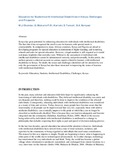| dc.contributor.author | Chomba, MJ | |
| dc.contributor.author | Mukuria, SG | |
| dc.contributor.author | Kariuki, PW | |
| dc.contributor.author | Tumuti, S | |
| dc.contributor.author | Bunyasi, BA | |
| dc.date.accessioned | 2015-06-15T07:54:23Z | |
| dc.date.available | 2015-06-15T07:54:23Z | |
| dc.date.issued | 2014 | |
| dc.identifier.citation | Disability Studies Quarterly Vol 34, No 4 (2014) | en_US |
| dc.identifier.uri | http://dsq-sds.org/article/view/3846/3793 | |
| dc.identifier.uri | http://hdl.handle.net/11295/84802 | |
| dc.description.abstract | Kenya has great potential for enhancing education for individuals with intellectual disabilities. The fact that it has recognized the need to care for learners with special needs is commendable. In comparison to many African countries, Kenya and Nigeria are ahead in developing programs for special education in institutions of higher learning, and in starting schools and units for special education. However, a legal mandate is still required as it would seal many loopholes that currently exist. Without it, the assessment of individual with intellectual disabilities cannot be administered correctly and professionally. In this article, the authors present a coherent account on various aspects related to learners with intellectual disabilities in Kenya. No doubt, the issues and challenges identified call for attention by not only the government of Kenya but also those interested in improving the status of learners with intellectual disabilities. | en_US |
| dc.language.iso | en | en_US |
| dc.subject | Education | en_US |
| dc.subject | Students | en_US |
| dc.subject | Intellectual Disabilities | en_US |
| dc.subject | Challenges | en_US |
| dc.subject | Kenya | en_US |
| dc.title | Education for Students with Intellectual Disabilities in Kenya: Challenges and Prospects | en_US |
| dc.type | Article | en_US |
| dc.type.material | en_US | en_US |

